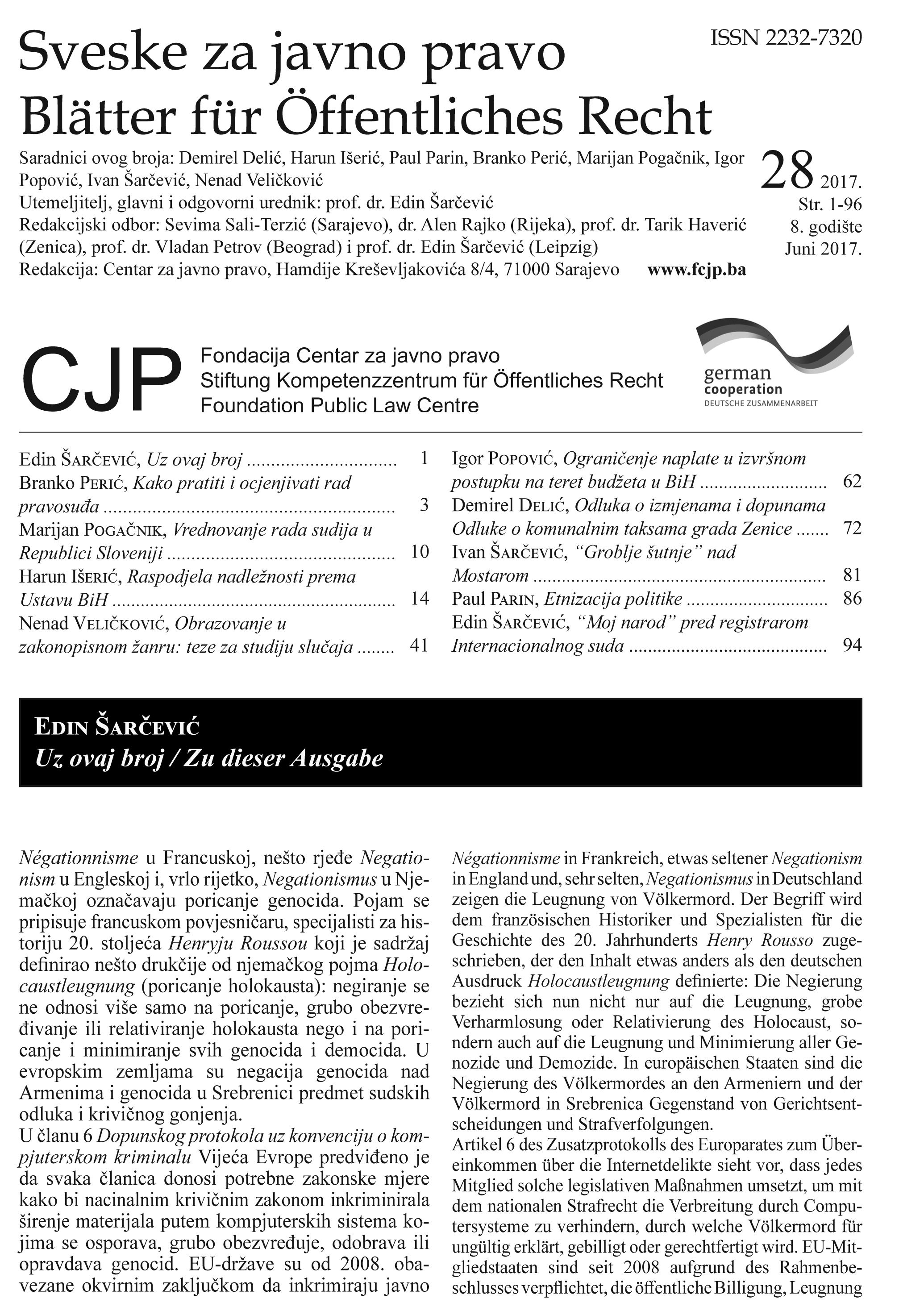Ograničenje naplate u izvršnom postupku na teret budžeta u BiH
Limitation of the enforcement of the monetary award against the state in Bosnia and Herzegovina
Author(s): Igor PopovićSubject(s): Law, Constitution, Jurisprudence, Public Administration
Published by: Fondacija Centar za javno pravo
Keywords: Law; Enforcement; Monetary award; Bosnia & Herzegovina;
Summary/Abstract: Bosnia and Herzegovina is, undoubtedly, not doing financially well. Both its foreign and domestic debt are enormous. Frequently, public authorities and budgetfunded organizations do not fulfill their pecuniary obligations towards creditors. Thus, creditors are forced to sue them, and initiate enforcement procedures, since the judgments are not enforced voluntarily. Furthermore, decisions of enforcement against public authorities and budgetfunded organizations are limited or prohibited in various ways. One of those limitations is the limitation of enforcement on a bank account of a public authority, i.e. on entity, cantonal or municipal budget. Rationale is the lack of budgetary funds. Decisions of enforcement allow money transfer from a state bank account to a creditor’s bank account, only if there is enough money in the budget for this purpose (enforcement of judgments). In Federation of Bosnia and Herzegovina (one of the two entities in the state) there is an additional obligation for public authority on all levels, to plan at least 0,3% of the budgetary funds for a judgment enforcement. There are no additional, indepth provisions.I argue that such a rule is contrary to the Constitution of Bosnia and Herzegovina and the European Convention for Human Rights and Fundamental Freedoms and that it violates the right to a fair trial and the right to property. Why? Because this rule does not allow the creditor to foresee when he will be able to collect its money, it does not provide for the number of existing creditors and their status of priority. Moreover, since the public authorities are not in possession of any information on the scale of this kind of debt (or this information has not been made public), the author argues that the minimum of 0,3% of the budgetary funds in Federation of BH is prescribed arbitrarily, without relevant statistics. Therefore, it is not possible to foresee whether this minimum of 0,3% will enable payment of the state debt in a reasonable time.The Constitutional court of BH has ruled in several instances on the unconstitutionality and nonconformity with the European Convention, of the above named provisions. It concluded that legislature is not proportionate with the scope of the right to property from Article 1 of the Protocol 1 to the European Convention. I agree only partially with this reasoning, and argue that these provisions do not fulfill the standard of lawfulness developed by the European Court for Human Rights, since the requirements of precision and foreseeability implied by the concept of law within the meaning of the European Convention are not met. Therefore, the problem is not about proportionality, but rather about lawfulness. I also criticize the Constitutional court’s caselaw for its method of determination of public interest used for delay of judgment enforcement, as well as for not delivering any pecuniary satisfaction for the judgment creditor (applicants). Further, I examine the European Court’s caselaw with regard to the time period which can be considered as reasonable time implied by the Article 6 of the European Convention. I conclude that the delay of judgment enforcement for even up to a year and a half can be regarded as unreasonable and contrary to the concept of a fair trial. Lastly, relying on the Constitutional court’s caselaw, I give concrete suggestions for solving the listed problems. Notably, I suggest the creation of a database containing all necessary information on enforceable state debt.
Journal: Sveske za javno pravo
- Issue Year: 8/2017
- Issue No: 28
- Page Range: 62-71
- Page Count: 10
- Language: Bosnian, Croatian, Serbian

